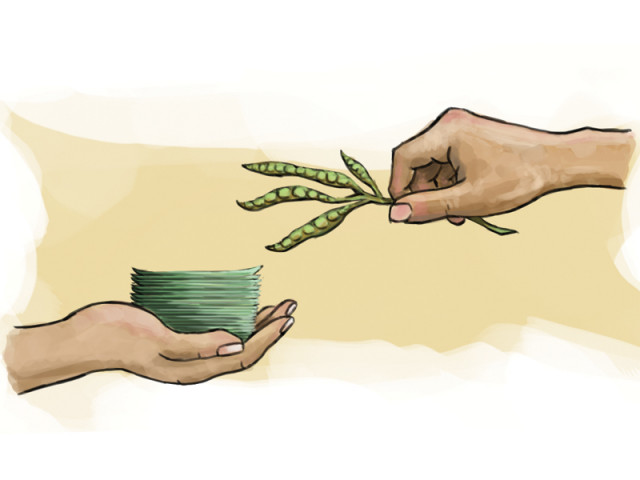Undiscovered goldmine: Phenomenal rise in guar production going unnoticed
Country expects highest production of cash crop in 18 years.

Guar and guar products export from Pakistan was just $29 million in 2006-07. It shot up to a record high of $152 million in 2011-12 before coming down to $139 million, still more than many other items. ILLUSTRATION: JAMAL KHURSHID
Guar, a little known plant grown entirely in the Indian subcontinent, is emerging as a major cash crop in Pakistan with returns surpassing cotton, rice, wheat and almost every other crop, traders say.
Pakistan expects harvest of over 250,000 tons in 2013, highest in 18 years, after more land came under cultivation following a spectacular rise in price in the last two years, they said.
“Prices have crashed since mid-2012 but people are hoping to reap increased gains this season, which ends around November,” said Muhammad Ilyas, a grain trader. “Production depends on rains. But if all goes well, we can see an output of even 300,000 tons.”
Guar or cluster bean has traditionally been used in India and Pakistan as animal feed and natural fertiliser. Guar split powder when mixed with liquid turns into a thickener, which has industrial applications ranging from making ice cream and beverages to textile manufacturing.
But the global surge in demand for guar powder or gum has been led by its increasing use for oil and shale fracturing. India has an 80% share in the market while rest of the demand is met from Pakistan.
Its importance as a major crop cannot be overstated. Guar and guar products export from Pakistan was just $29 million in 2006-07. It shot up to a record high of $152 million in 2011-12 before coming down to $139 million, still more than many other items.
Price has come down to Rs90 per kilogramme (kg) now from a high of Rs300 per kg recorded in 2012.
“International buying has slowed down because of environmental apprehensions surrounding shale drilling. But farmers and traders have shown a tremendous interest in guar,” said Waheed Sheikh, manufacturer of guar gum and splits.
It is hard to estimate the exact size of the cultivated area as guar is sown on in far-flung arid and semi-arid areas of Punjab, Sindh and Khyber-Pakhtunkhwa. Most of the production comes from Sargodha and Tharparkar.
But according to the Pakistan Bureau of Statistics, guar was cultivated over 154,821 hectares in 2008-09.
Pakistan has 11 companies making guar split with Pak Gum Industries being the largest producer. Pak Gum and Chemicals Limited is also the only one listed on the stock exchange.
In the six months to June 2013, Pak Gum and Chemicals Limited posted earnings per share of Rs15.88, down 71% from Rs55.93 in the same period of previous year.
The company has literally basked in profits since guar price surged. It tells how much money dealers have made. In 2009, its EPS was Rs1.26. It posted a loss of Rs11.73 in the following year. In 2011, its EPS rose to Rs30.11 and finally to Rs57.42 in 2012.
Background
Until four years ago, when new investors started setting up guar processing plants, the market in Pakistan was controlled by four large firms.
“It was an oligopoly that kept prices low here. From 1983 to 1995, price ranged between Rs2 and Rs3 per kg. Then it slowly moved up and reached Rs13 in 2005. It was still too low to generate any substantial interest among farmers,” said Sheikh.
Pakistan mostly produces food-grade guar gum but at least two investors are setting up plants, which will produce gum of over 7,000 cps (a measure for viscosity), which is used in the oil and gas industry.
Malik Ameer, a broker, said successive governments have ignored the crop. “Farmers get no support when it comes to the supply of right seeds. Result is that our yield of guar bean is 27kg from 100kg of crop against India’s 32kg.”
Guar crop does not need fertiliser or pesticide, making it relatively cheap to cultivate. “It all depends on rain.”
Shale use
Shale drilling has revolutionised the search for petroleum reserves as more oil and gas are pumped out from previously hard-to-reach subsurface regions.
Exploration companies use fracturing to crack open underground pockets where hydrocarbons are trapped. For that, they need to pump liquids down the wells at high pressure. High viscose guar gum is the perfect agent for that purpose.
Published in The Express Tribune, September 12th, 2013.
Like Business on Facebook, follow @TribuneBiz on Twitter to stay informed and join in the conversation.



1725254039-0/Untitled-design-(24)1725254039-0-208x130.webp)















COMMENTS
Comments are moderated and generally will be posted if they are on-topic and not abusive.
For more information, please see our Comments FAQ